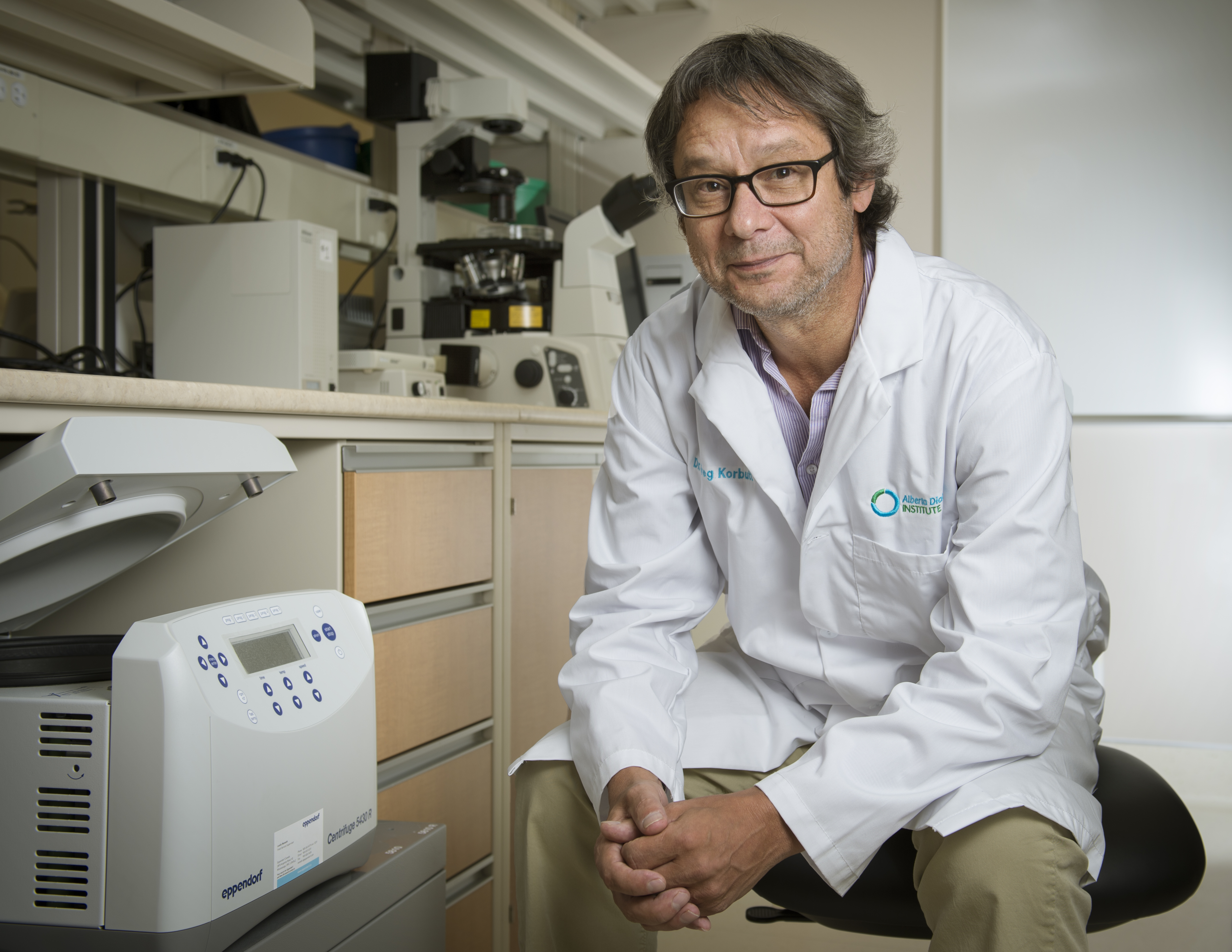
Gregory Korbutt, a professor of surgery at the U of A
The following story was originally published on Sept. 27, 2016. Over the past year the Faculty of Medicine & Dentistry's Gregory Korbutt has been awarded five grants worth more than $2 million in total to help advance his diabetes related research.
"I think we're fortunate here in that we have basic scientists like myself who are doing the research in the lab, and then because we have close colleagues who are surgeon scientists, it helps us bring our discoveries into the patient," says Korbutt. "We've got a good transition of research into the clinic, which I think is quite unique. It's one of the reasons why we've been so successful."
Other notable funding and how it will benefit diabetes patients:
1. Canadian Institutes of Health Research (CIHR) granted University of Alberta's Greg Korbutt and James Shapiro more than $760,000 over five years to explore strategies to maximize survival of transplanted islets and reduce the body's immune response. One such strategy the pair will explore is pairing islet cells with mesenchymal stem cells-found in tissues such as bone marrow-which have shown potential as a regenerative medicine therapy for many degenerative diseases and immune disorders.
2. JDRF awarded Korbutt and two co-investigators from Australia $740,000 over two years to create a more hospitable site for islet cells. The researchers plan to use a specially designed scaffold material under the skin to promote the creation of a new blood supply. They then aim to harness that property to create a "safe-haven" for islet cells.
3. JDRF International granted Korbutt and a co-investigator from the University of Alabama just under $200,000 over two years to encapsulate neonatal porcine islets with a protective coating in hopes of using the modified cells to fight diabetes in humans. The nano-thin bilayers of protective material are meant to deter or prevent immune rejection.
4. Funding worth $109,000 was granted to Greg Korbutt and a collaborator in Sydney, Australia over a one-year period to generate a genetically modified neonatal porcine islet product. The goal is to create genetically modified cells that are resistant to inflammation and promote a local environment within the transplant patient that is able to achieve immune tolerance.
JDRF and the University of Alberta's Faculty of Medicine & Dentistry are pleased to announce further research to improve transplant procedures for human islet (insulin-producing) cells, so people with type 1 diabetes can one day live injection-free.
Gregory Korbutt, a professor of surgery at the U of A, in collaboration with Carlo Montemagno, director of the University of Alberta's Ingenuity Lab, has been awarded $824,164 (USD) to perfect his new "scaffold" used in transplants, which will help create a more hospitable environment for the islet cells, ensuring they survive longer.
Designed to create ideal blood flow conditions in the body, this unique scaffold will protect the implanted islets and provide them with enough oxygen to stimulate insulin production. The scaffold also allows for the delivery of immunosuppressant drugs to protect against transplant rejection.
"This research represents a critical step forward in viable transplant treatments that will greatly improve the lives of people living with type 1 diabetes, by one day making daily insulin injections a thing of the past," said Dave Prowten, President and CEO, JDRF Canada. "This team is well positioned to rapidly transfer their findings to clinical trials."
"Our group is the first to develop a new approach to functionalize a device that enables the incorporation of selected growth factors or other advantageous proteins," said Korbutt, principal investigator, University of Alberta and an Alberta Diabetes Institute scholar. "With our scaffold we will be able to create a highly vascularized space that will allow long-term islet graft survival and function."
"I am very grateful to the JDRF for 22 years of continuous support that began in 1994 as a Postdoctoral fellow. This partnership has been invaluable throughout my career and continues to play an essential role in my work to help Canadians living with diabetes."
In addition to his ongoing research efforts, Korbutt also serves as the scientific director of the Alberta Cell Therapy Manufacturing (ACTM) facility which recently opened at the University of Alberta. The facility is the only one of its kind in western Canada and, according to Korbutt, will help transition the findings of his [and other scientists'] work directly into patients.